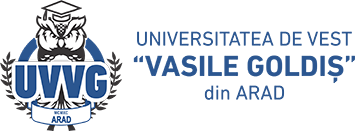History
Scientific Director: Prof. Louis BEGIONI, PhD, University of Rome Tor Vergata, Professor Emeritus, University of Lille, France, Doctor Honoris Causa of the “Vasile Goldiș” Western University of Arad / Professeur de Universités de l’Université de Rome Tor Vergata, Professeur émérite de l’Université de Lille, Docteur Honoris Causa de l’Université de l’Ouest «Vasile Goldiș» d’Arad.
Chief Executive Manager: Assoc. prof. Speranța Milancovici, PhD, Dean, Faculty of Social Sciences, Humanities, and Physical Education and Sports, of the “Vasile Goldiș” Western University of Arad / maître de conférences, Doyen de la Faculté de Sciences Sociales, Humaines et Education Physique et Sports de l’Université de l’Ouest «Vasile Goldiș» d’Arad.
Scientific Board:
Coralia Adina Cotoraci, MD PhD, prof. habil., Rector of the “Vasile Goldiș” Western University of Arad
Louis Begioni, PhD, Prof., University of Rome Tor Vergata, Professor emeritus, University of Lille, France, Doctor Honoris Causa of the “Vasile Goldiș” Western University of Arad
Speranța Milancovici, Dean, Faculty of Social Sciences, Humanities, and Physical Education and Sports, of the “Vasile Goldiș” Western University of Arad
Thomas Vercruysse, Associate Professor, Luxembourg University
Virginie Besme-Mermé, convened professor, psycho-genealogist, Institute of Psycho-Genealogy, Paris, France
Gabriel Balaci, professor, “Vasile Goldiș” Western University of Arad
Radiana Marcu, professor, “Vasile Goldiș” Western University of Arad
Mission
This institute aims to develop research in the field of Speech Therapy, both theoretically and considering its therapeutical applications.
In addition, it may provide for specialised training sessions for experts in various fields wishing to interact with Speech Therapy.
Purpose
Main research directions:
- Theoretical research aimed to clarify the specificities of Speech Therapy in relation with the existing concepts regarding the psyche (psychology, psychoanalysis, psychotherapy, neurology etc.) and to set a reference pattern that mainly consider the initial contribution of the psyche, its noetic dimension.
- Design of a speech therapy model based on the fundamental principles issued by Viktor Frankl that considers the diachronic and synchronic dimensions of the patient’s experience. This endeavour will rely mainly on Elisabeth Lukas’s work (directed autobiography), but also on other researchers’ activity in speech therapy.
- Reflections on an integrative speech therapy model – such as Viktor Frankl himself proposed in his fundamental papers:
– Erickson’s speech therapy and hypnosis (Logo-Hypnosis),
– Speech therapy and psycho-genealogy,
– Speech therapy and Gestalt therapy,
– Speech therapy and healthcare practices,
– etc.
- Speech therapy and applications in the healthcare field, in oncology speech for instance:
– reflection on the so-called “oncology speech” protocols for care services delivered to the cancer patients in remission. The goal would be to measure the therapeutic impact of “oncology speech” on the patient’s immune responses in order to prevent for relapses. This therapeutical model is part of a systemic system of the individual where the psyche, the noetic soma sphere are tightly connected and where we postulate for the existence of the noetic antibodies able to trigger stress related and emotional shocks traumas.
This protocol may be divided into 6 main stages:
1) the convened development of the “oncology speech” integrative protocol.
2) testing the protocol on a cohort of patients recently in remission;
3) qualitative and quantitative assessment of the achieved results compared to patients not submitted to this protocol;
4) reviewing the protocol through the gathered results;
5) if noteworthy results are achieved, generalising the protocol to a higher number of patients.
The speech therapy implies a cross-disciplinary perspective, especially with the language sciences, which might bring a valuable contribution in the field of the patient’s speech analysis in order to establish the language structures characteristic for the exposed disorders.
In addition, this institute may provide the experts from various field (medicine, psychotherapy, teaching, personal assistance etc.) training sessions directed towards raising their awareness on the Speech Therapy potentialities and its applications.
Description
Direcții de activitate

Din activitățile noastre
The Logotherapy project, run with the support of Arad County Council and Arad County Cultural Centre (contract no. 3008 of 01.08.2022)
Implementation team:
| ASSOC. PROF. SPERANȚA SOFIA MILANCOVICI, PhD – PROJECT MANAGER |
| ASSIST. PROF. ȘTEFAN IAROSLAV DANIEL, PhD candidate |
| LECTURER BAN EMILIAN, PhD |
| LECTURER BALACI GABRIEL, PhD |
SCIENTIFIC COUNSELLOR: PROF. LOUIS BEGIONI, PhD
The publication of the volume proposed in this project continues an endeavour initiated and successfully run during the past years, by organising some workshops and an online seminar dedicated to speech therapy.
The goal of the current project was to facilitate the experts’ and, in general, Arad citizens’ access to scientific and cultural information, to increasing the Arad students’ and teaching staff’s involvement in the scope of social sciences and humanities in the debates animating the international scientific community with regard to the multi- and inter-culture that mark the current research endeavours.
The project aimed for increasing the beneficiaries’ level of information on the configuration, structure, and dynamics of the current European scientific area with particular openness towards borderline sciences combining various areas of expertise.
Thus, we selected as volume topic the existential analysis which is a complex form of psychotherapy focusing on the human individual looking for the meaning of life.
Viktor Frankl tried the existing forms of psychotherapy during his time, namely in the 1920’s, but he was disappointed by them as they ignored what he considered as being fundamental, i.e. the meaning of life.
Nowadays, while being in full social transformations, caused by the technological advances, the new philosophic and economic trends, once again it is important to ask ourselves questions regarding the meaning of life. We speak more often in psychopathology and psychotherapy of new pathologies requiring new forms of psychotherapy. However, at a closer look, we notice that it is not about new psychological pathologies, but of new forms of symptomatology. Which is fundamental for the individual’s psychosocial balance is the meaning which the individual can find in its own life.
Regardless of the social or technological transformations, the human cannot live beyond the meaning. This makes us bring back in the spotlight that form of psychotherapy aiming precisely for the search of the meaning of life.
Even if existential psychotherapy and speech therapy have been developed at the beginning of the 20th century, we find out that they are needed and very well adjusted to all the troubles the individuals are facing today regardless of their age, gender, political orientation, or religious belief. Therefore, we consider that this type of psychotherapy deserves its own place even in the curricula of the faculties of psychology or of the medical faculties. Both psychologists and physicians, namely those who face the human suffering, need the knowledge comprised in the theoretical framework of this type of psychotherapy to better understand the way how the individual lives its own life.
Publishing the tome comprising specialised papers based on several psychotherapy experts’ clinical experience is a first effort we intend to make in providing for psychotherapists, physicians, social workers, and not only, access to methods, and techniques where the human suffering is approached in relation with the meaning of life. When a person knows the reason for its living, which is the meaning of one’s life, that person’s capacity to bear with the suffering grows higher, and the painful experiences may be psychologically integrated in its subjective experience. The human’s capacity to live, not just the pleasure, but also the suffering, represents one of humans’ fundamental traits. The existential psychotherapy and the speech therapy have as main goal to help the human subject live its life in relation to its meaning, and not only in relation with a permanent consumption of pleasure.
This tome represents a first stimulus aimed to guide the social sciences and humanities experts’ attention towards this fundamental matter, the meaning of our lives.
All team members contributed to the good implementation of the publishing project, but also the authors of the papers reunited under the title of La Logothérapie aujourd’hui. Perspectives de recherche interdisciplinaires et applications (Logotherapy Nowadays. Perspectives and Interdisciplinary Research and Applications), published the University Press of Cluj, in partnership with CIRMI – Paris, under ISBN 978-606-37-1647-8 / ISBN 978-2-910007-36-2.
La Logothérapie aujourd’hui. Perspectives de recherche interdisciplinaires et applications, Speranța Sofia Milancovici, Louis Begioni (coord.), Presa Universitarăț Clujeană / CIRMI – Université Sorbonne Nouvelle Paris 3, 2022, ISBN 978-606-37-1647-8 / ISBN 978-2-910007-36-2, 217
CONFERINȚE, SIMPOZIOANE ȘI WORKSHOPURI

On May 22, 2024, the Centre for Research and Training in Logotherapy of “Vasile Goldiș” Western University of Arad organized an event in partnership with educational institutions from abroad, dedicated to the very current and, at the same time, dynamic issue of logotherapy.
The discussions touched on complex, interdisciplinary topics and brought together online a significant number of participants from Romania and from abroad. Among them:
Prof. Louis Begioni, PhD., University of Rome Tor Vergata, Italy, Scientific Director of the Centre for Research and Training in Logotherapy – UVVG Arad
Dr. Georges-Elia Sarfati, Efrate Director, Paris, France
Gabriel Balaci, PhD., UVVG Arad
Virginie Bessis Mermé, Associate Professor, Psycho-Genealogist, Institute of Psycho-Genealogy, Paris, France
Thomas Vercruysse, Associate Professor, PhD., University of Luxembourg
The purpose of this workshop was to improve the professional skills of specialists, giving them the opportunity to learn directly from experts in the field, but also to exchange experience and knowledge.




